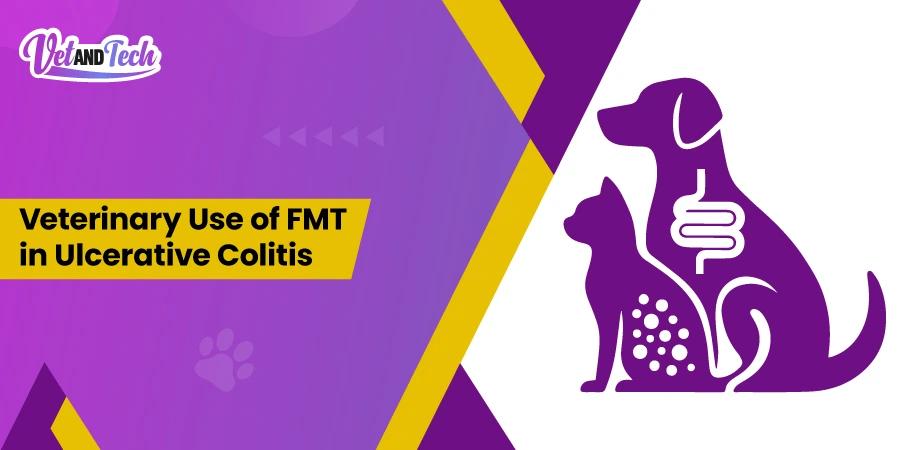The Role of FMT in Refractory Ulcerative Colitis & IBD in Veterinary Patients
Chronic gastrointestinal diseases like ulcerative colitis (UC) and inflammatory bowel disease (IBD) in cats and dogs can be distressing for both pets and their owners. When medicines and prescription diets fail, how about FMT being a great alternative? Fecal Microbiota Transplantation involves the transfer of healthy gut flora into the gastrointestinal tract of animals with chronic gastrointestinal illness, including ulcerative colitis.
This therapy is innovative in that it transfers healthy gut flora from a donor animal into the patient's gastrointestinal tract. It's more than just an option; it's a microbiome reset with benefits that foster long-term, positive change.
What is fecal microbiota transplantation (FMT)?
FMT is the transfer of healthy donor fecal material (or gut microbiome) into a diseased patient's gastrointestinal tract to help restore microbiome balance. FMT has been used in human patients for the treatment of refractory ulcerative colitis and Clostridium difficile infections. FMT therapy is also increasingly being accepted in veterinary patients.
This treatment is founded upon the influence of the gut microbiome on overall well-being. For pets with chronic GI disease, including fecal transplant ulcerative colitis, this regimen could be the difference between perpetual relapse and actual recovery.
Signs of Ulcerative Colitis and IBD in Animals
Both IBD and ulcerative colitis are characterized by chronic inflammation of the GI tract. IBD or UC signs in dogs and cats can include:
- Chronic diarrhea (sometimes with mucus or blood)
- Vomiting
- Loss of appetite
- Weight loss
- Lethargy
- Abdominal pain
These conditions may be refractory to conventional treatments such as corticosteroids, immunosuppressants, and dietary modifications. This is where FMT for dogs and cats presents a gut-focused solution.
How FMT Works in Veterinary Patients
The premise behind fecal microbiota transplantation (FMT) in pets is straightforward yet powerful. By introducing a diverse, balanced microbial population from a healthy donor animal, the diseased patient’s gut microbiome begins to re-establish its normal function. This leads to:
- Reduced inflammation
- Improved intestinal barrier function
- Suppression of harmful pathogens
- Restoration of metabolic pathways
In refractory ulcerative colitis, where medications have failed, the rebalancing of gut flora via stool transplant for ulcerative colitis often results in clinical improvement.
Is FMT a Good Treatment Option in Dogs and Cats?
Studies and clinical experiences show that fecal transplant in dogs and cats suffering from chronic IBD or UC can lead to:
- Marked symptom reduction
- Less reliance on corticosteroids
- Improved energy levels and appetite
- Reversal of chronic diarrhea
- Better stool consistency
Some veterinarians have even reported success using FMT capsules for dogs, offering a convenient alternative to rectal administration.
Surprisingly! A single dose of FMT has shown lasting improvements in GI symptoms for some veterinary patients, with effects visible within days.
FMT vs Traditional Refractory UC Treatment: Which Is Better
|
Approach |
Effectiveness in Refractory UC |
Side Effects |
Sustainability |
|
Corticosteroids |
Limited in long-term management |
Immunosuppression, weight gain |
Temporary |
|
Immunosuppressants |
Variable |
Risk of infection |
Often needs lifetime use |
|
FMT Therapy |
Promising results in many cases |
Minimal (if screened well) |
Long-term microbial reset |
FMT offers a biological, root-cause approach instead of simply masking symptoms. For veterinary patients who no longer respond to medications, FMT can provide a renewed quality of life.
Donor Selection & Administration in Veterinary FMT
Selecting a healthy donor is critical. Donor animals must:
- Be free of GI disease
- Have no history of antibiotic use within the past 3 months
- Test negative for parasites, viruses, and pathogenic bacteria
- Routes of Administration
- Rectal enema (most common)
- Oral FMT capsules
- Nasogastric tube
While FMT for cats often requires sedation for administration, dogs typically tolerate rectal infusions or capsules quite well.
When Should You Consider FMT for Dogs & Cats?
Veterinarians may consider FMT for dogs and cats when:
- There's a confirmed diagnosis of IBD or UC unresponsive to standard therapies
- Antibiotic-responsive diarrhea relapses after treatment
- There’s chronic dysbiosis or GI symptoms with no clear etiology
- Pet owners are seeking holistic, long-term options
FMT is not a first-line treatment, but a promising second-tier or adjunct therapy, especially in refractory cases.
Want to learn more about fecal microbiota transplantation in pets?
Join Vet And Tech Webinar to Explore the Healing Potential of FMT for IBD and UC.
 Join us on June 25th, 2025, for an exclusive, expert-led webinar exploring the science, clinical applications, and practical implementation of FMT in cats and dogs.
Join us on June 25th, 2025, for an exclusive, expert-led webinar exploring the science, clinical applications, and practical implementation of FMT in cats and dogs.
Register here and gain CE credit while learning how FMT can transform your approach to challenging GI cases.
Healing Begins in the Microbiome
The gut is not just a digestive organ; it's a neurological and immune powerhouse. FMT therapy allows veterinary specialists to treat the root of ulcerative colitis and IBD by rebuilding the sensitive balance of the microbiome.
As science advances, so does our obligation to provide innovative, safe, and useful solutions. FMT is not just a treatment; it’s a transformational approach for refractory GI cases.
FAQs
Who is not a candidate for a fecal transplant?
Animals with severe immunosuppression, systemic infections, or chronic disease not in remission may not be good options for fecal microbiota transplantation (FMT). Furthermore, animals that cannot tolerate sedation (if needed) or oral capsules may need alternative therapy or routes of administration.
What is a fecal transplant for colitis?
A fecal transplant for colitis entails donating stool from a healthy donor to an Ulcerative Colitis impacted patient to help reestablish microbial balance, decrease inflammation, and relieve colitis symptoms.
Can FMT cure ulcerative colitis?
FMT does not "cure" UC in the classical meaning of the word, but it can result in long-term remission and substantial reduction in symptoms. It's particularly exciting for refractory or drug-resistant cases.







